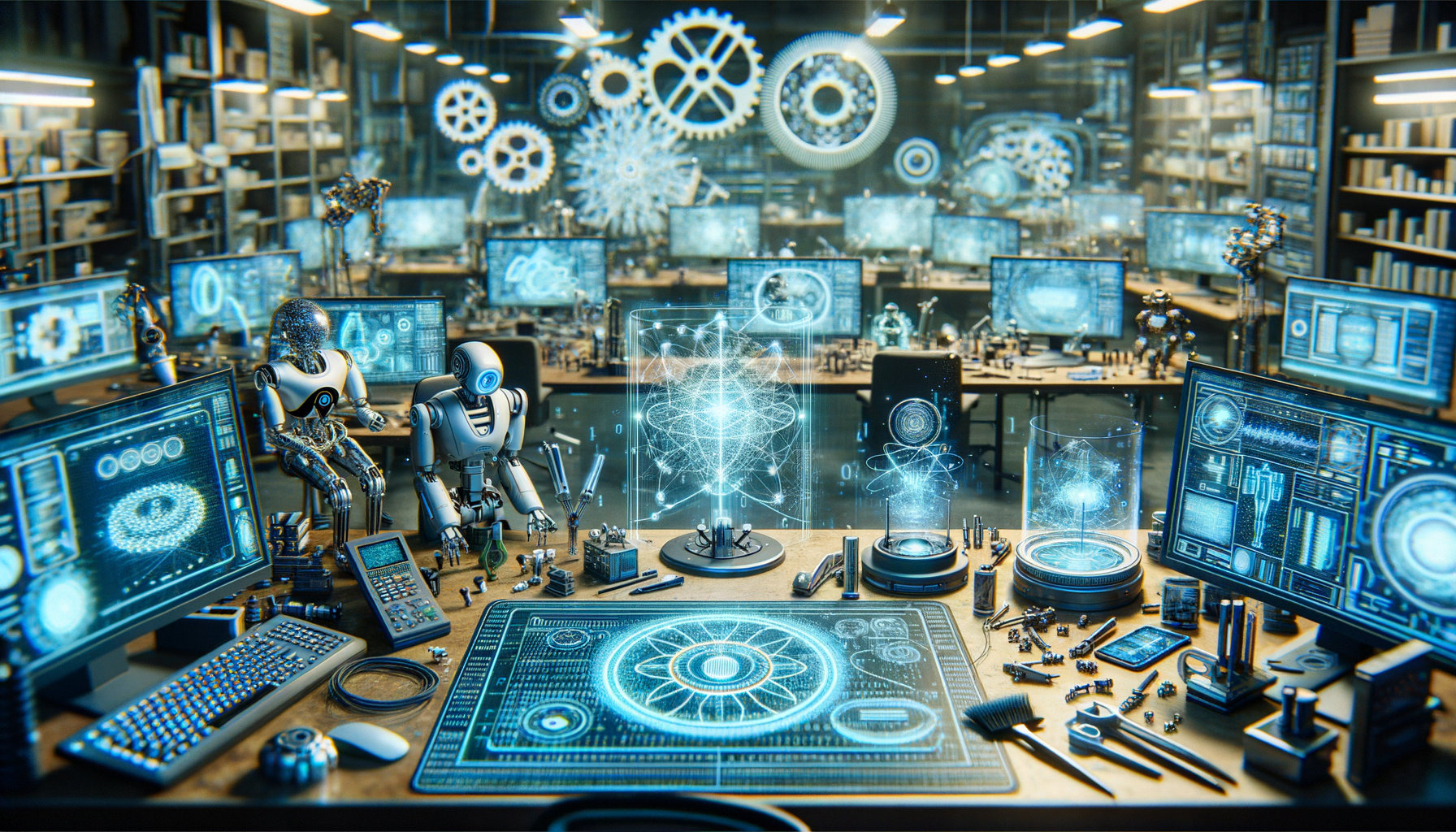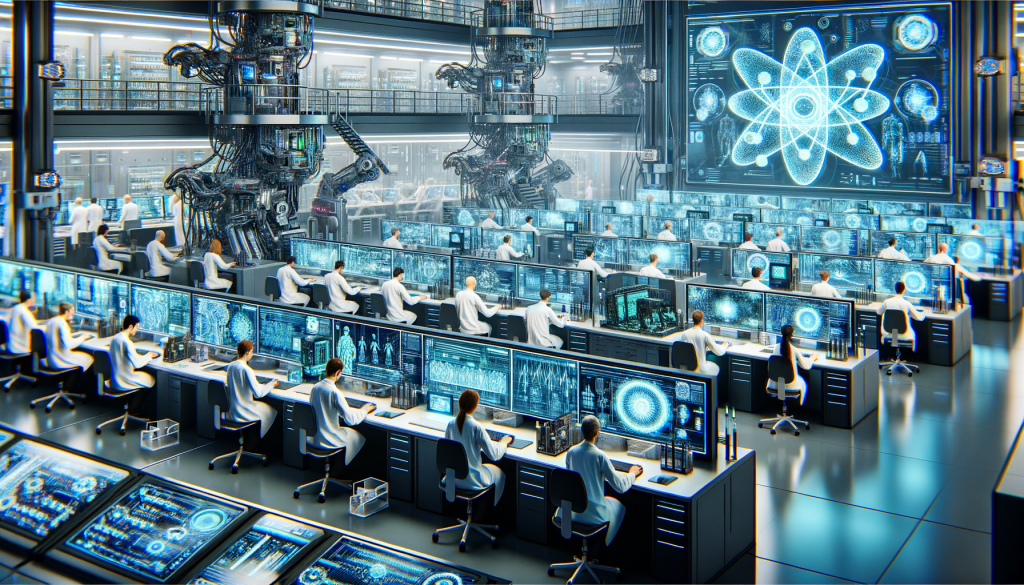As I stand at the crossroads of technological advancement, I find myself both excited and cautious about the rapid evolution of various fields. The digital landscape is buzzing with innovations that promise to reshape our lives in ways we can hardly imagine. From artificial intelligence to quantum computing, the hype surrounding these technologies can be overwhelming.
It’s easy to get swept up in the excitement, but I believe it’s essential to navigate this hype with a discerning eye. Understanding the implications of these advancements is crucial, not just for tech enthusiasts but for everyone who will be affected by these changes. In this article, I aim to explore some of the most transformative technologies of our time.
Each section will delve into how these innovations are not only changing industries but also redefining our everyday experiences.
As I embark on this journey through the realms of artificial intelligence, quantum computing, biotechnology, blockchain, augmented reality, and the Internet of Things, I hope to provide a balanced perspective that highlights both the potential and the challenges that lie ahead. By doing so, I hope to equip myself—and you, dear reader—with the knowledge needed to embrace the future with confidence.
Key Takeaways
- Artificial intelligence is revolutionizing industries by automating processes and providing valuable insights.
- Quantum computing has the potential to unlock unprecedented computational power, leading to breakthroughs in various fields.
- Biotechnology is transforming healthcare and beyond with advancements in gene editing, personalized medicine, and more.
- Blockchain is disrupting traditional systems by providing secure and transparent transactions and data management.
- Augmented reality is enhancing human experience by overlaying digital information onto the physical world, creating new possibilities for entertainment, education, and more.
Artificial Intelligence: Transforming Industries
Artificial intelligence (AI) has emerged as a cornerstone of modern technology, fundamentally altering how industries operate. As I delve into this realm, I am struck by the sheer breadth of AI applications—from automating mundane tasks to enhancing decision-making processes. In sectors like finance, AI algorithms analyze vast amounts of data to identify trends and make predictions that were once the domain of human analysts.
This not only increases efficiency but also allows for more informed decision-making, which can lead to significant financial gains. However, as I explore the transformative power of AI, I also recognize the ethical dilemmas it presents. The rise of machine learning and deep learning has sparked debates about job displacement and privacy concerns.
While AI can streamline operations and reduce costs, it also raises questions about the future of work and the potential for bias in algorithmic decision-making. As I reflect on these issues, I realize that embracing AI requires a careful balance between innovation and responsibility. It is imperative that we develop frameworks that ensure AI technologies are used ethically and inclusively.
Quantum Computing: Unlocking Unprecedented Power

Quantum computing stands at the frontier of technological innovation, promising to unlock computational power far beyond what classical computers can achieve. As I immerse myself in this fascinating field, I am captivated by the principles of quantum mechanics that underpin these machines. Unlike traditional computers that process information in binary form, quantum computers utilize qubits, which can exist in multiple states simultaneously.
This unique property allows them to solve complex problems at an astonishing speed. The implications of quantum computing are profound. In fields such as cryptography, drug discovery, and climate modeling, quantum computers could revolutionize our approach to problem-solving.
For instance, as I consider the potential for drug discovery, I am excited by the prospect of simulating molecular interactions with unprecedented accuracy. This could lead to breakthroughs in medicine that were previously unimaginable. However, I am also aware of the challenges that lie ahead, including the need for robust error correction and the development of practical quantum algorithms.
As I ponder these complexities, I understand that while quantum computing holds immense promise, it is still in its infancy.
Biotechnology: Revolutionizing Healthcare and Beyond
Biotechnology is another area where I see remarkable advancements reshaping our world. The ability to manipulate biological systems has opened new avenues for healthcare and agriculture alike. As I explore this field, I am particularly fascinated by developments in gene editing technologies like CRISPR-Cas9.
This revolutionary tool allows scientists to edit genes with precision, offering potential cures for genetic disorders and even some forms of cancer. The prospect of eradicating diseases that have plagued humanity for centuries fills me with hope. Yet, as I delve deeper into biotechnology, I am reminded of the ethical considerations that accompany such powerful tools.
The ability to edit genes raises questions about designer babies and the potential for unintended consequences in ecosystems. As I reflect on these dilemmas, I realize that while biotechnology has the potential to enhance our quality of life significantly, it is crucial to approach these innovations with caution and a strong ethical framework. Balancing scientific progress with moral responsibility will be essential as we navigate this brave new world.
Blockchain: Disrupting Traditional Systems
Blockchain technology has emerged as a disruptive force across various sectors, challenging traditional systems and redefining trust in digital transactions. As I delve into this decentralized ledger technology, I am intrigued by its potential to enhance transparency and security in everything from finance to supply chain management. The idea that transactions can be recorded in an immutable way without the need for intermediaries resonates deeply with me; it represents a shift towards greater autonomy and accountability.
However, as I explore the landscape of blockchain, I also encounter challenges that must be addressed for widespread adoption. Issues such as scalability and energy consumption are significant hurdles that need innovative solutions. Additionally, while blockchain offers enhanced security features, it is not immune to risks such as hacking or fraud.
As I consider these complexities, I recognize that while blockchain holds great promise for transforming industries, it requires careful implementation and ongoing dialogue about its implications for society.
Augmented Reality: Enhancing Human Experience

Augmented reality (AR) is a technology that captivates my imagination by blending digital information with the physical world. As I explore AR applications—from gaming to education—I am struck by its potential to enhance human experiences in profound ways. For instance, AR can transform how we learn by providing interactive visualizations that make complex concepts more accessible.
Imagine being able to visualize historical events or scientific phenomena right in front of you; this immersive experience could revolutionize education. Moreover, AR has practical applications in fields like retail and healthcare. As I consider how AR can enhance shopping experiences by allowing customers to visualize products in their own space before making a purchase decision, I see a future where consumer engagement is elevated to new heights.
However, as with any technology, there are challenges to overcome—such as ensuring user privacy and addressing potential distractions in everyday life. As I reflect on these considerations, I understand that while AR has the power to enrich our experiences, it must be integrated thoughtfully into our lives.
Internet of Things: Connecting the World
The Internet of Things (IoT) represents a paradigm shift in how we interact with our environment. As I delve into this interconnected web of devices—from smart home appliances to industrial sensors—I am amazed by the potential for increased efficiency and convenience in our daily lives. The ability for devices to communicate with one another opens up new possibilities for automation and data collection that can lead to smarter decision-making.
However, as I explore the vast landscape of IoT, I am also acutely aware of the challenges it presents. Security concerns loom large; with so many devices connected to the internet, vulnerabilities can be exploited by malicious actors. Additionally, issues related to data privacy arise as personal information is collected and shared across networks.
As I contemplate these challenges, I realize that while IoT has the potential to create a more connected world, it is imperative that we prioritize security and privacy measures to protect users.
Embracing the Future
As I conclude my exploration of these transformative technologies, I find myself filled with a sense of optimism tempered by caution. Each innovation—whether it be artificial intelligence, quantum computing, biotechnology, blockchain, augmented reality, or the Internet of Things—holds immense potential to reshape our world for the better. However, it is crucial that we approach these advancements with a critical eye and a commitment to ethical considerations.
Embracing the future means not only celebrating technological progress but also engaging in meaningful conversations about its implications for society. As we navigate this rapidly changing landscape together, I believe it is essential to foster collaboration among technologists, policymakers, and communities to ensure that these innovations serve humanity as a whole. By doing so, we can harness the power of technology while safeguarding our values and aspirations for a better tomorrow.
In the article “Beyond the Hype: The 3 Emerging Technologies I’m Genuinely Excited About,” the author delves into groundbreaking technologies that are set to revolutionize various industries. A related piece that complements this discussion is “Rebellion on Mars: The Fight for Freedom and Independence,” which explores the potential of space technology and its implications for future colonization and autonomy on Mars. This article provides an intriguing perspective on how emerging technologies could play a pivotal role in shaping the future of human settlements beyond Earth. For more insights, you can read the full article here.

